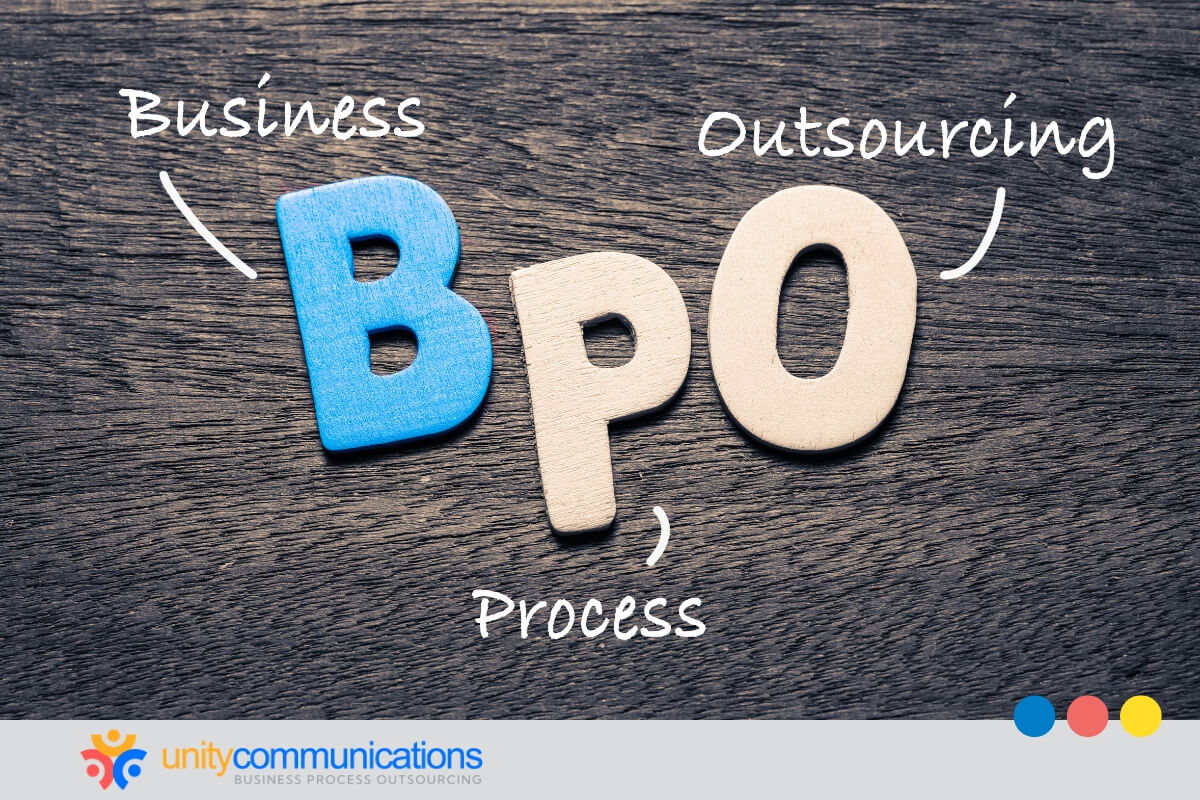Table of Contents
Managing global operations is a complex and resource-intensive process. Business process outsourcing (BPO) offers a calculated approach to maximize productivity and streamline processes.
The increasing reliance on BPO highlights a significant shift in how companies manage operations, particularly globally. This is evident in the projected expansion of the global BPO industry, with a compound growth annual rate (CAGR) of 9.6% through 2030.
This article explores the key advantages and strategies of using BPO in managing global operations effectively. Keep reading to learn valuable insights!
BPO’s role in managing global operations

What is BPO’s role in managing global operations? BPO provides the expertise, technologies, and solutions to streamline global operations. BPO firms manage non-core business functions, allowing your organization to focus on core activities such as innovation and market penetration.
Integrating BPO into global operations gives businesses significant advantages. These benefits include cost reduction, higher productivity, and enhanced customer satisfaction.
Assessing global operational needs and challenges
Companies expanding rapidly or enhancing services across regions can benefit from outsourcing. However, conducting a thorough evaluation of business operations is necessary to identify critical challenges a BPO organization can help address.
Many issues hinder efficiency and growth. One is diversity, which many multinational companies face. An EY survey shows that although many employees feel belongingness, 75% still experience exclusion. About 56% are uncomfortable sharing their identity, especially members of LGBTQ+.
BPO firms can help build a more welcoming culture by hiring a diverse workforce, offering diversity and cultural sensitivity training, and creating inclusive policies. Additionally, flexible work arrangements such as telecommuting allow employees to do their jobs in settings where they feel most comfortable.
Other potential problems include:
- Cost is another significant factor when managing a global workforce, particularly in areas with high labor costs. BPO providers can offer up to 70% labor cost savings by outsourcing specific to more affordable countries without compromising service quality.
- Scalability is crucial for businesses to adapt to changing market conditions. However, it is challenging without the right resources and infrastructure. BPO providers offer effective, flexible solutions with access to an extensive global talent pool and advanced infrastructure. Their clients can expand or contract operations with minimal operational interruption.
- Expertise is often a challenge for global businesses. Acquiring specialized skills in all areas is time-consuming and costly. BPO providers address this concern with their vetted pool of skilled professionals in IT, customer service, finance, HR, and more.
- Complex, varying regulatory requirements are expensive due to hefty penalties for violations. BPO firms have legal teams to comply with regional laws and regulations and manage paperwork.
- Different time zones can disrupt productivity and communication. BPO providers in strategically located regions can offer 24/7 support so businesses can maintain operations around the clock, improve response times, and serve customers globally without delay.
- Data breaches and security threats are significant concerns, especially when dealing with sensitive customer or employee data across borders. BPO providers implement robust data security measures and comply with certifications and data security standards to boost trust and minimize risks.
Selecting a BPO provider with expertise in managing global operations

Choosing the right BPO provider plays a crucial role in the success of your global business operations. Your outsourcing partner must understand your business objectives and possess the competencies to help achieve your goals.
Consider the following factors:
- Industry experience: An expert BPO provider can better understand your unique challenges and requirements. It can offer tailored solutions and insights based on their knowledge of your sector.
- Global reach: Ensure the vendor operates in your markets to enable seamless communication and coordination with local teams. This guarantees they understand diverse markets, cultural nuances, and regional regulations.
- Technology capabilities: Assess the provider’s advanced tools and platforms. A modern BPO company should leverage technology to improve efficiency, enhance security, and provide better data analytics.
- Reputation: Research the provider’s track record and customer reviews. Look for testimonials from satisfied clients and assess their industry reputation, indicating quality service and reliability.
- Cultural alignment: Shared values encourage open communication and lead to successful outcomes. To build trust, assess their responsiveness, integrity, and transparency during initial interactions. In addition, evaluate their employee relationships, retention rates, and skill development and collaboration opportunities offered.
Identifying critical functions for BPO integration in global operations
Leveraging BPO in managing global operations requires strategic planning. You must integrate outsourcing services into business functions that address your operational needs and challenges.
Below are commonly outsourced processes:
Customer support services
BPO providers can significantly improve customer satisfaction by offering comprehensive and efficient support services, mainly through call centers.
One primary feature of BPO is support availability across multiple time zones and languages. This approach ensures that customers can always receive assistance regardless of location and at their convenience. A study finds that 78% of customers would remain loyal to a company with excellent customer service delivery.
BPO also offers access to cutting-edge technology for customer support. Chatbots and call-routing systems can streamline customer interactions, reduce response times, and route inquiries to the correct agents. By providing instant responses and accurate and timely information, BPO firms can improve customer satisfaction.
Measuring performance is crucial for identifying improvement areas and maintaining high-quality customer support. BPO providers can track vital metrics such as customer satisfaction scores (CSAT), net promoter scores (NPS), and first-call resolution rates. Analyzing this data can spot trends and implement targeted changes to boost customer satisfaction.
Information technology (IT) support
Reliable IT support boosts productivity and minimizes downtime. BPO providers can offer tailored IT support services, which is especially beneficial for companies with international operations.
Specific IT functions to outsource include:
- Helpdesk and technical support: Providing first-level support to employees and customers.
- Desktop and server support: Managing hardware and software installation, configuration, and maintenance.
- Network administration: Maintaining and troubleshooting networks, including LANs, WANs, and VPNs.
- Security management: Implementing and monitoring security measures to protect IT systems and data.
- Systems administration: Managing operating systems, databases, and applications.
- Data backup and recovery: Ensuring data protection and disaster recovery planning.
Outsourcing IT support allows you to reallocate internal resources to core competencies while meeting tech needs efficiently and cost-effectively.
Supply-chain management
Leveraging BPO services for supply-chain management can improve efficiency, reduce costs, and strengthen the resilience of global operations. BPO providers offer specialized expertise and streamlined processes to optimize supply-chain performance.
Inventory management is vital to supply chain efficiency. A BPO vendor can help maintain optimal stock levels across regions. It uses data analytics to forecast demand and optimize inventory management.
BPO providers also add value to logistics coordination by selecting optimal transportation modes, managing customs clearance, and simplifying warehousing operations. Lastly, BPO firms can enhance supply-chain resilience by identifying potential disruptions, assessing risks, and strengthening supplier relationships to mitigate risk.
Human resource (HR) management
BPO integration can significantly streamline HR processes, reduce administrative burdens in managing global operations, and allow companies to focus on their core competencies.
Managing payroll and benefits is complex, especially for businesses operating in multiple jurisdictions. BPO providers can ensure compliance with local regulations, accurately process payroll, and manage employee benefits programs, helping companies avoid costly penalties and errors.
Meanwhile, recruiting and onboarding talent in different regions can be challenging due to cultural differences, language barriers, and varying labor market conditions. BPO providers with a global presence can help source qualified candidates, conduct interviews, and facilitate onboarding, saving time and resources in hiring the best talent.
Lastly, employee support increases customer satisfaction and retention. BPO firms can offer assistance with relocation, visa applications, and cultural adjustment. This can help employees settle into new roles and feel supported in their new environment.
Financial and accounting processes
A study finds that the finance industry has the most significant remote work potential. This is especially true in the United States, where 76% to 86% of banking and financial tasks can be remote without sacrificing efficiency.
Flexibility enables companies to partner with BPO service providers instead of hiring full-time staff, streamlining operations and saving costs. In fact, the increasing adoption of finance and accounting (F&A) BPO services drives the global market’s annual growth of 9.3%.
Transactional tasks such as processing invoices, payments, and expense reports can be time-consuming and error-prone. Automating these processes reduces manual effort and significantly improves accuracy. BPO can assist in this initiative as providers adopt cloud computing, process automation, and business analytics technology.
BPO providers can contribute to the success of managing global operations by offering expert financial analysis for informed decision-making. They generate detailed reports, analyze financial performance, provide strategic recommendations, and identify trends.
In addition, BPO providers stay updated on the latest regulations and ensure financial processes meet all relevant requirements, standards, and rules to avoid costly penalties and legal issues.
Implementing robust communication channels

Effective communication is a cornerstone of successful global operations. To clarify expectations and ensure alignment among regional teams, you must set language, time zone differences, and reporting guidelines. BPO providers can establish and maintain robust communication channels.
BPO firms can manage collaboration platforms such as video conferencing, instant messaging, and document sharing to facilitate real-time communication and collaboration across teams and regions. These tools can help break down geographical barriers and promote unity within the organization.
Cross-cultural training is also essential for effective global communication. BPO firms can offer training programs to help employees understand cultural differences and communication styles, reduce misunderstandings, and strengthen relationships.
Communication is vital to team performance. Cross-cultural training facilitates better communication and collaboration by educating team members about various communication styles and cultural views.
This fosters cultural understanding, promotes inclusivity and respect in the workplace, and improves business outcomes. Studies have shown that inclusive workplaces are eight times more likely to achieve strong business results.
Implementing these strategies can strengthen the foundation for effective communication and collaboration within global operations. It can also improve productivity, long-term efficiency, and business success.
Monitoring and analyzing global market trends
BPO vendors can provide data-centric insights to help your company identify and adapt to global market opportunities and threats. They leverage data analytics to monitor market trends, competitor activities, and emerging technologies. The insights allow you to be more responsive and develop strategies accordingly.
BPO providers also perform behavior analysis to help you understand customer’s needs, preferences, and purchasing patterns. You can use this information to improve your marketing campaigns, engage your target audience, satisfy consumers, and develop products that fulfill your target market.
Maximizing the BPO provider’s data analytics capabilities can benefit your company and give it a competitive advantage in navigating the dynamic global marketplace.
Ensuring compliance with regulations and standards

Regulatory compliance is critical when managing global operations, as regions have unique laws and standards. You must address customer privacy and security while promoting ethical business practices.
According to a study, regulatory compliance and operational, financial, and technological risks are among the top emerging business concerns.
BPO providers can help companies navigate complex regulations by monitoring legal changes, complying with local laws and standards, and conducting regulatory audits.
Essential regulatory areas that BPO companies can help include:
- Data privacy: Regulations, including the General Data Protection Regulation (GDPR), the California Consumer Privacy Act (CCPA), and the Health Insurance Portability and Accountability Act of 1996 (HIPAA) impose strict requirements for handling personal and sensitive data.
- Security standards: Specific security standards protect client data. Examples include ISO/IEC 27001, Payment Card Industry Data Security Standard (PCI DSS), and SOC.
- Labor laws: These include compliance with all labor laws regarding employment practices, working conditions, and rights of employees that companies must respect and follow. Examples are the Fair Labor Standards Act (FLSA), the Occupational Safety and Health Act (OSHA), and the Family and Medical Leave Act (FMLA).
- Industry-specific regulations: BPO companies help businesses comply with industry-specific regulations. For example, they follow HIPAA standards to protect patient data when handling tasks such as medical billing. For finance, they comply with the Dodd-Frank Act to ensure transparency and reduce financial risks.
Strict regulation adherence helps your firm avoid risks, maintain a good reputation, and sustain longevity.
The bottom line
Leveraging BPO in managing global operations provides strategic advantages, such as operational and cost efficiency, effective communication, market adaptation, and regulatory compliance. Depending on your operational needs, you can integrate BPO services into various business functions, such as customer support and supply-chain management.
Ready to implement BPO for your global operations? Let’s connect to discuss your business needs and explore how we can help achieve your goals.




